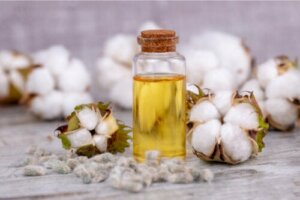Cottonseed Oil: Uses, Benefits, and Risks


Reviewed and approved by the pharmacist Franciele Rohor de Souza
Cottonseed oil is a product obtained from the plant species known as Gossypium hirsutum and Gossypium herbaceum. In particular, it’s used for cooking, although it also has medicinal and cosmetic applications.
Since the 1880s, it has been part of the American diet and has become one of the most popular vegetable oils in the United States. However, at present, it’s not as popular in the market, since other varieties, such as soybean and corn oil, have displaced it.
In any case, it’s an oil that stands out for being a source of polyunsaturated fatty acids, which contribute to cardiovascular health. It’s also a versatile product that you can include in your diet in many ways. But what do the studies say? And what are its possible risks?
Uses of cottonseed oil
Cottonseed oil is regularly used in the food industry, as it has the ability to extend the shelf life of foods. You can find it in products such as potato chips, pastries, mayonnaise, margarine, and salad dressings.
It’s even preferred in baked goods, as it provides moisture and texture. Other foods in which it’s present are the following:
- Oriental foods
- Glazes
- Whipped toppings
- Cereals
- Spicy foods
Among other things, it’s important to note that this product also has non-food purposes, such as oil lamps, candles, insecticides, and laundry detergents. At the same time, it also has some medicinal and cosmetic uses.

Benefits of cottonseed oil
The benefits of cottonseed oil have to do largely with its nutritional quality. Specifically, it provides only some 4 grams of saturated fat per tablespoon, or 16% of the recommended daily intake. In order to reduce cardiovascular risk, entities such as the American Heart Association suggest choosing oils with these saturated fat characteristics.
However, it also contains 7 grams of polyunsaturated fat per tablespoon, which gives it heart health benefits. To be more precise, it provides 2% of the daily intake of omega-3 fatty acids and 58% of omega-6.
To a lesser extent, it also contains monounsaturated fat, which experts recommend in the diet as a supplement to stimulate the increase of HDL or “good” cholesterol. It’s also a source of vitamin E or alpha-tocopherol, a key nutrient for cell metabolism and disease prevention. But is there evidence of its effects on our health? Let’s see!
You may be interested in: Virgin Olive Oils: Are They All Good For You?
1. Anti-inflammatory effects
There are no studies that prove that cottonseed oil has anti-inflammatory properties. However, there’s evidence for the anti-inflammatory effects of monounsaturated fats. In that sense, this variety of oil may have an impact on the reduction of inflammatory chemicals in the blood.
Its monounsaturated fat content is 18% but can be increased to 50% when partially hydrogenated. In any case, it’s a nutritional supplement that acts within the framework of a healthy diet.
2. Protection of cardiovascular health
The monounsaturated and polyunsaturated fatty acids that this oil contains contribute to a decrease in the risk of cardiovascular events. A review article that appeared in the Cochrane Library suggests that this type of lipid lowers LDL cholesterol levels and raises HDL cholesterol levels. In turn, this reduces the risk of coronary heart disease or stroke.
Still, we should keep in mind that cottonseed oil has more saturated fats than other vegetable oils, such as olive oil. Therefore, consuming it in excess can have the opposite effect. Therefore, we should use it in moderation; only when it’s not possible to choose another, more heart-friendly oil.
3. Antitumor activity
Cottonseed oil isn’t an alternative therapy against cancer. However, some research has made relevant findings on the benefits of cottonseed oil against this disease.
A study that the journal Anticancer Research published determined that gossypol–a natural toxin that’s present in this oil before refining–helped suppress cancer cells that showed resistance to multiple drugs.
Meanwhile, a study in Molecular Cancer Therapeutics found that this substance was also useful in reducing tumor growth in patients with prostate cancer. For now, it’s a subject that’s still under investigation, so more evidence is necessary.
4. Skincare
One use of cottonseed oil that’s not considered controversial has to do with skincare. Given its vitamin E and fatty acid content, this ingredient provides the following benefits:
- Moisturizing
- Anti-aging
- Increased skin permeability (a quality that helps the skin better absorb other products)
- Skin barrier protection
- Wound healing

Read also: 4 Natural Solutions for Common Beauty Problems
The risks of cottonseed oil
The risks associated with the use of cottonseed oil have to do with its gossypol content. This substance is a natural toxin that gives it its particular yellow color.
Among other things, it also protects the plant against insects. And although it has been studied for its antitumor potential, it’s been found to have the following negative effects:
- Infertility
- Problems in the gestation period, including early embryonic development
- Liver damage
- Respiratory distress
- Anorexia
The possibility of some people being allergic to the external use of cottonseed oil is also something to consider. Therefore, it’s best to do a small sensitivity test before using the product in its entirety. If, after 24 hours, there’s no sign of allergy, you can apply it without any problems.
Other oils are more recommended
For a long time, cottonseed oil stood out for its properties, price, and versatility. While it’s true that it has some benefits, one shouldn’t ignore its possible risks and its saturated fat content. Therefore, when it comes to choosing a good oil, it’s best to opt for other varieties, such as olive or sunflower oil.
Even so, experts consider most of the commercial presentations of this oil to be safe as they don’t pose a problem if used in moderation. The product should be stored in an airtight container, away from direct sunlight, in a cool place.
All cited sources were thoroughly reviewed by our team to ensure their quality, reliability, currency, and validity. The bibliography of this article was considered reliable and of academic or scientific accuracy.
- Munroe CE. The Use of Cotton-Seed Oil as Food, and for Medicinal Purposes. Public Health Pap Rep. 1884;10:236-240.
- Daniel DR, Thompson LD, Shriver BJ, Wu CK, Hoover LC. Nonhydrogenated cottonseed oil can be used as a deep fat frying medium to reduce trans-fatty acid content in french fries. J Am Diet Assoc. 2005 Dec;105(12):1927-32. doi: 10.1016/j.jada.2005.09.029. PMID: 16321599.
-
Allayee H, Roth N, Hodis HN. Polyunsaturated fatty acids and cardiovascular disease: implications for nutrigenetics. J Nutrigenet Nutrigenomics. 2009;2(3):140-8. doi: 10.1159/000235562. Epub 2009 Sep 23. PMID: 19776641; PMCID: PMC2820567.
-
Schwingshackl L, Hoffmann G. Monounsaturated fatty acids and risk of cardiovascular disease: synopsis of the evidence available from systematic reviews and meta-analyses. Nutrients. 2012;4(12):1989-2007. Published 2012 Dec 11. doi:10.3390/nu4121989
- Ravaut G, Légiot A, Bergeron KF, Mounier C. Monounsaturated Fatty Acids in Obesity-Related Inflammation. Int J Mol Sci. 2020;22(1):330. Published 2020 Dec 30. doi:10.3390/ijms22010330
- Abdelhamid AS, Martin N, Bridges C, et al. Polyunsaturated fatty acids for the primary and secondary prevention of cardiovascular disease. Cochrane Database Syst Rev. 2018;7(7):CD012345. Published 2018 Jul 18. doi:10.1002/14651858.CD012345.pub2
- Huang, Y., Wang, L., Chang, H., Ye, W., Dowd, M., Wan, P., & Lin, Y.C. (2006). Molecular mechanisms of (-)-gossypol-induced apoptosis in human prostate cancer cells. Anticancer research, 26 3A, 1925-33 .
- Volate SR, Kawasaki BT, Hurt EM, et al. Gossypol induces apoptosis by activating p53 in prostate cancer cells and prostate tumor-initiating cells. Mol Cancer Ther. 2010;9(2):461-470. doi:10.1158/1535-7163.MCT-09-0507
- Keen MA, Hassan I. Vitamin E in dermatology. Indian Dermatol Online J. 2016;7(4):311-315. doi:10.4103/2229-5178.185494
- Gadelha IC, Fonseca NB, Oloris SC, Melo MM, Soto-Blanco B. Gossypol toxicity from cottonseed products. ScientificWorldJournal. 2014;2014:231635. doi:10.1155/2014/231635
This text is provided for informational purposes only and does not replace consultation with a professional. If in doubt, consult your specialist.








